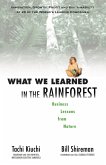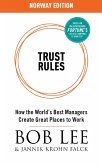A guide to the parallel revolutions in technology, organizations, and leadership, this practical yet thought-provoking book presents a wealth of evidence to show that the two recurrent themes of democracy and enterprise are transforming our institutions. Organizations are becoming changing clusters of entrepreneurial units working together to form "internal markets," while this diversity is being integrated into a "corporate community" that unites the interests of investors, workers, clients, business partners, and the public. Even fierce competitors are cooperating. o "Serving enterprises" make customers working partners in the creation of value o "Knowledge entrepreneurs" form teams of self-managed internal enterprises o "Internal markets" and "Corporate community" harness external forces to drive continuous change o The power of "inner leadership" unites liberated workers, critical clients, and temporary business partners o "Intelligent growth" offers strategic advantage that is ecologically benign Illustrative examples, survey data, trends, anecdotes, and exercises offer original insights into the use of New Management principles. In addition, mini-case studies of MCI, Saturn, The Body Shop, Hewlett-Packard, Johnson & Johnson, Southwest Airlines, Home Depot, IKEA, Wal-Mart and other great companies illustrate vividly how creative managers design and lead organizations in an era of global competition, constant change, and empowered people. The author also analyzes critical issues, such as the nagging old conflict between profit and society, to provide managers a comprehensive, stimulating guide to where their craft is heading. Halal argues that the transition to a New Management is almost inevitable because it is being driven not by altruism or even good leadership, but by the relentless advance of the Information Revolution. Only small entrepreneurial teams operating from the bottom-up can master today's exploding complexity, and gaining stakeholder support is now essential because a knowledge-based economy has made cooperation a competitive advantage. Rather than fussing over quick fixes, The New Management points the way toward more fundamental solutions to the massive changes that will confront all institutions as the transition to a knowledge society rolls on into the 21st century.
Dieser Download kann aus rechtlichen Gründen nur mit Rechnungsadresse in A, D ausgeliefert werden.









